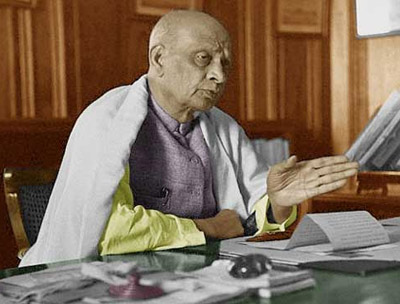 Today
Today is the birth anniversary of Sardar Patel. He unified India and put a check on communal outfits which created a poisonous atmosphere that resulted in the tragic assassination of Mahatma Gandhi. He banned those organisations for the cause of social harmony and national unity.
It is because of Sardar Patel we have today in our Constitution special safeguards for minorities. He was the Chairman of the Committee of the Constituent Assembly which had the mandate to look into the rights of minorities.
He authored that report of the Committee which recommended the special safeguards for the minorities of India and those special safeguards were accepted by the Constituent Assembly and eventually incorporated in the Constitution of India.
India was partitioned and very unfairly Muslims of our country were and are being blamed for it. I was educated from one of Sardar’s letters to G.D.Birla in which he wrote that petrol situation in the world played a role in the partition of India. We have created a myth that Muslims were responsible for partition of India.
That letter is there in a book entitled “Immortal Icons” which contain correspondence of G.D.Birla with leaders of our freedom struggle. Late Shri K.R.Narayanan as President of India wrote an illuminating foreword to it.
In 1999 the London Archives released classified papers concerning partition of India. Those papers revealed the real purpose behind the division of our country. It was found in those papers that India was divided to ensure unhindered access of western powers to oil resources in the Gulf region.
The western powers wanted to create a country by diving India and that to just next to Afghanistan so that it could be used to checkmate the erstwhile Soviet Union which had a strategy to occupy Afghanistan and use it as a base to extend its influence to the Gulf region and stop oil supply to the western powers whose economies were critically dependent on Gulf oil.
That strategy of the Soviet Union was part and parcel of the grand ideological worldview of that country to defeat the capitalist block. So what was revealed by the classified papers released by the London Archives in 1999 was known to Patel in 1940s.
He was the Chairman of a Municipality in Gujarat. He wrote to Mahatma Gandhi that he intended to allocate some money to a temple for its repair. Gandhiji wrote back by stating that if he wanted to allocate some money to a temple then he should also allocate some amount to repair a dilapidated Mosque. Sardar abandoned the plan.
On one occasion when Sardar Patel came to attend a session of the Indian National Congress he found a separate enclosure for Dalits where they would seat. He in instead of occupying a seat earmarked for him in the main enclosure, straight way proceeded to the enclosure meant for Dalits and sat there and delivered his speech from that enclosure. This point was prominently mentioned in the speech of President K.R.Narayanan when he unveiled the statute of Sardar Patel in front of Central Hall of Parliament.
In one of his last speeches in 1950 he intensely reflected on rising levels of corruption and cautioned about its danger.
In all the above mentioned points we found a constructive vision for the unity of India and for treating all citizens equally irrespective of their faith, caste and social and economic status. I salute Vallabhbhai Patel, Sardar of India.
# The author was OSD and Press Secretary to the late President of India Shri K.R.Narayanan and served as Director in the Prime Minister's Office. He is currently Joint Secretary in the Rajya Sabha Secretariat. The views expressed by the author are his personal views.
 Today is the birth anniversary of Sardar Patel. He unified India and put a check on communal outfits which created a poisonous atmosphere that resulted in the tragic assassination of Mahatma Gandhi. He banned those organisations for the cause of social harmony and national unity.
Today is the birth anniversary of Sardar Patel. He unified India and put a check on communal outfits which created a poisonous atmosphere that resulted in the tragic assassination of Mahatma Gandhi. He banned those organisations for the cause of social harmony and national unity.